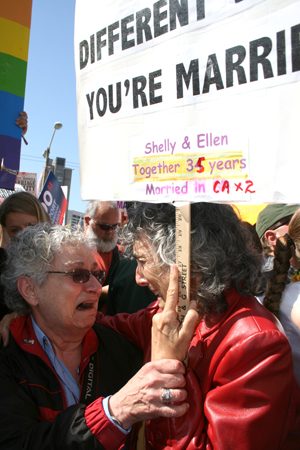California therapists struggle in Prop. 8 aftermath.
San Francisco psychotherapist Rebecca Silverstein says she needs no further proof than her own consulting room that legalizing same-sex marriage is good for your mental health.
“Marriage provides practical and emotional support. It gives couples and parents the legal rights they need to feel more secure.”
She says her clients have “very different expectations” of their rights than they did a few years ago. “The psyche of LGBT people has shifted profoundly.”
Silverstein, a member of California Therapists for Marriage Equality and a board member of Gaylesta (an association of Bay Area LGBT therapists) and others have struggled for nearly a year to persuade the California Association of Marriage and Family Therapists to take this shift into account and oppose Prop. 8.
The proposition stripped gays and lesbians of the right to marry and in May survived a state Supreme Court challenge. CAMFT works with regulatory agencies and the state legislature to advance the interests of marriage and family therapists.
Members first appealed to CAMFT before the measure was put before voters in November. The American Psychological Association, the California Psychological Association and the American Psychiatric Association had already come out against the measure.
When Prop. 8 passed, members demanded that CAMFT sign on to an amicus brief prior to a Supreme Court ruling on the validity of Prop. 8. Similar messages were delivered in open letters from the president and faculty of Antioch University Los Angeles and from Phillips Graduate Institute.
When the board met in January it decided not to take any position on the measure. Executive Director Mary Riemersma wrote in a letter to Antioch and L.A.-based therapists stating that “issues of social justice and civil rights are best pursued by those organizations that are formed and devoted to that purpose.”
Then-president Patrick Healy, writing in the organization’s magazine, added, “taking a stand would alienate a percentage of CAMFT members who believe it is not CAMFT’s place to take a stand, and/or those who in fact believe they were correct by supporting and voting for Proposition 8.”
Some members say they can no longer support an organization they think misunderstands the crucial ties between marriage equality and the therapy profession. When the Supreme Court legalized gay marriage in 2008, they point out, out of 45 amicus briefs filed it cited only one: that of the American Psychological Association, whose extensive psychological research supported the court’s opinion that prohibiting same-sex marriage constitutes not only a social burden but a form of discrimination.
CAMFT’s Riemersma insists the board has taken a position on the issue: “Their position is, if you boil it down to its essence, CAMFT does not support engaging in discrimination or discriminatory acts of any kind, (and) that would have to do with people of the same sex who decide to marry.”
CTME’s Jim Walker says the boilerplate nondiscrimination policy isn’t what members asked for, and CAMFT should follow the lead of the APA, which in 2004 resolved to oppose “all discrimination in legal benefits, rights and privileges against same-sex couples.” Walker notes the distinction is crucial, “especially since CAMFT is an organization for marriage and family therapists.”
The latest chapter in the debate is a special section in the May/June issue of CAMFT’s The Therapist magazine, which rehashes a disturbing array of homophobic views, including the claim that marriage equality leads to “the indoctrination of public school students” and threatens religious freedom. An article titled “Same-Sex Marriage: Not in the Best Interest of Children” is accompanied by a photo of a forlorn child with head in hand; a piece with the promising title “An Inside Look at Gay Parenting” is a memoir of an abusive childhood that implies that gay parents cause suffering and neglect.
Silverstein says therapists felt betrayed. “We thought we were getting a chance to educate the 30,000 therapists who work with couples and families, who should know how to be culturally sensitive to work with LGBT clients.…I was shocked and a bit sickened to see that our articles were in one section called ‘Supporting Same Sex Marriage’ and that there was another section called ‘Supporting Traditional Marriage’ that had one article after another repeating some of the most awful anti-gay propaganda you can imagine.”
She says the magazine does damage to her profession. “This magazine sits in the waiting room in therapists’ offices. If people read these anti-gay articles…what LGBT person would trust an MFT as a therapist? CAMFT is supposed to be defending and supporting us professionally. Instead, it is degrading our license.”
Riemersma says the matter is on the agenda for CAMFT’s board meeting this fall, but “I have no idea what direction the board will go.” Meanwhile, California therapists are reassessing where to go from here.
